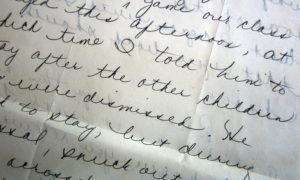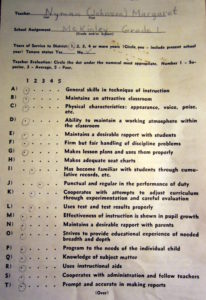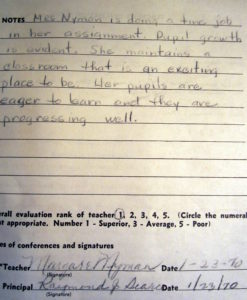February 3, 1970
Connecting with my 1st graders each morning was always uplifting, and I’d gotten to know them well. We had an open house coming up during which I could get acquainted with their parents, and though it involved lots of preparation and made for a long day, I was looking forward to it. I was working hard to have something positive to say that night about each student — even the “problem children.”
Hoping my kids were progressing academically and also relating well to each other, I wanted each parent to be proud of their own child.
 However, one afternoon just before the open house, we were playing a spelling game in class when a boy named Bobby cheated to win it. Another child exposed him, and there was a class uproar over it. I told him to stay after school so we could talk about it, hoping that by then I could figure out what to do.
However, one afternoon just before the open house, we were playing a spelling game in class when a boy named Bobby cheated to win it. Another child exposed him, and there was a class uproar over it. I told him to stay after school so we could talk about it, hoping that by then I could figure out what to do.
Bobby agreed, but when the bell rang, he raced out and sprinted across the front lawn. Of course the other children, wanting justice, alerted me. “Bobby’s running away!”
I sprinted out after him, catching him by his coat. “Remember about our talk?” I said.
“I know,” he said, looking at the snowy ground.
The two of us trudged back into school, and I explained the serious nature of cheating, hoping it was sinking in.
 “So…. what do you think we should do about this?”
“So…. what do you think we should do about this?”
I was surprised when he said, “I think…. write a note to my mom and tell her.”
He stood next to me, watching me write. When I was done, I folded the paper, and asked him to take it to his mother. He said he would.
But then I decided to add one more sentence: “Please sign this note and return it with Bobby so I know you received it.” I drew a line and put an X in front of it, showing him I wanted his mother to put her name there. His brow furrowed, but he pocketed the note and said goodbye.
The next morning Bobby walked in with a smile, handing me my signed note as well as 3 pages written by his mother. “She’s not mad,” he said.
His mother’s note agreed that cheating was a big deal. She’d had a serious talk with Bobby, telling him that if it happened again, “stronger action would be applied.”
She wrote that Bobby wanted me to be proud of him, and that he had run away because he knew he’d disappointed me. She explained that the source of his bad behavior might have been baby brother Billy. Bobby was jealous of Billy getting to stay home with her all day, saying it wasn’t fair.
There was sibling rivalry with lots of teasing and follow-up discipline, the stress of which was “spilling over on the other members of the family.” And she thanked me for “taking the time to talk to Bobby and to let her know the problem.”
I decided to give Bobby extra attention — starting with praising him for delivering my note to his mother and bringing hers back to me. In the end, I felt like the whole incident had worked out well.
That afternoon it occurred to me that in many respects I was like a mother-away-from-home for my young students, and I wondered if some day I might get to be a real mother. If so, I was fairly sure the job would be challenging, and I hoped I would be up to it.
“To discipline a child produces wisdom.” (Proverbs 29:15)






